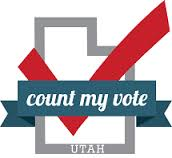
The Utah Republican Party (UTGOP) is suing the State over the passing of SB 54, also known as the Count My Vote Compromise, citing the law violates portions of the Utah State Constitution.
S.B. 54 aimed to find a compromise between the current caucus/convention and a direct primary election. However, the UTGOP points out that the Constitution allows for individual parties to decide how to choose their own candidates.
The lawsuit states that S.B. 54 "violates the party's constitutional right to free association and infringes on its rights to free speech and due process, its ability to control its own brand and message, and its authority over its endorsement, name, and emblems."
Since the 1800’s, Utah has used the caucus system to choose its candidates for all national, state and county positions. Neighbors meet together as precincts to choose delegates. These delegates work to represent their precinct's interests and ideas, research and interview potential candidates, and ultimately choose candidates during their party’s convention by casting 60% of the votes for one of the candidates. Because of the nature of the caucus system, candidates must work very hard to reach out and care about every delegate.
During an event sponsored by the Olene Walker Institute at Weber State University earlier in 2014, Lieutenant Governor Cox explained that the current caucus system requires candidates to care about each delegate, knock on their doors, sit in their homes and work for each vote. This intimate part of the campaign will be lost under a direct primary system.
“There is a reason Utah is a fly-over state” during presidential campaigns, Cox said. This is because everyone knows how Utah will vote and it is not worth the candidate’s time to stop here. Cox believes the Count My Vote initiative will create “fly-over counties” with most of rural Utah being ignored.
Another issue with a direct primary is the exorbitant cost and the diminishing quality of the candidates. While it is easy to get onto the ballot under a primary election selection system, those with more money to spend to get their name out are those that win. Very quickly, especially in hot debated areas, these elections become so big and costly that most candidates can’t compete. Research clearly shows a direct correlation between money spent and elections won.
A date has not been set to hear the case in federal court, but it is anticipated to be heard within the coming year.